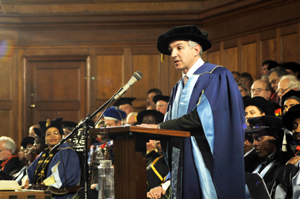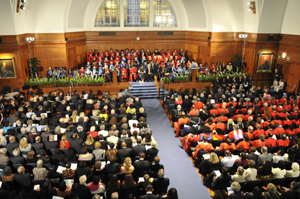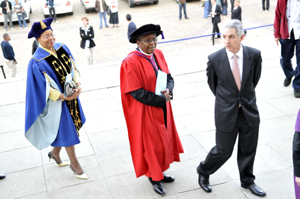UCT: Local, African, Global
25 August 2008 |
On the symbolism of an inauguration | On the threats facing our society | On protecting democracy | On the university's role | On culture and values | On transformation and leadership | On the changing nature of education | On future graduates | On UCT's niche | On the university's African roots | On UCT being an Afropolitan university | On attracting staff and students | On threats to South Africa | On safety and security | On the creation of pro-vice-chancellors | On the school system | On thanks
The installation of Dr Max Price as Vice-Chancellor last Tuesday afforded him the opportunity to publicly present his vision and hope for the university to a broad community of scholars, staff, students, alumni, donors, VIPs and guests. These excerpts are distilled from his full address
On the symbolism of an inauguration:
When I suggested to the deans a few months ago that we do away with all this expensive, pretentious pageantry, they objected that both the internal and external communities expect a grand inauguration. On reflection, I now understand this better. The robes and ceremony are demanded by society because society expects the university to play a leadership role within it, to be a counterpoint to the state, and indeed to religious authorities, for knowledge, analysis and ethical guidance, and that the university must take responsibility for playing that role and recognise the authority it has been granted to do so.
On the threats facing our society:
I know I am not alone in fearing for the increasing fragility of our fledgling democracy. In my view, free speech, a free press, judicial independence, and socio-economic rights are increasingly under threat. Debates on race and transformation are often the camouflage for these attacks.
Universities have a critical role in defending democracy, and UCT in particular, having a proud and long record in this regard during the pre-democratic era, needs to take up that responsibility. Universities can also promote democracy by educating their students in citizenship. That's what sets universities apart from training institutions.
UCT should ensure that it is resolutely committed to providing a highly skilled workforce to the South African and global economies, and one that is not just well-trained, but more importantly, well-educated, and mindful of the responsibilities of democratic citizenship. This is the basis upon which UCT makes its most profound contribution to the development and transformation of our society.
My standing here, in this garb, with this funny hat, alongside all these other colourfully-frocked men and women, is a tacit pledge to society, to you ladies and gentlemen, that the University of Cape Town will step up to the plate, will honour its responsibility to provide intellectual and moral leadership, will encourage its academic staff in their roles as public intellectuals, will welcome students in their questioning and challenging of the old and often corrupted ways of doing things, and will not be afraid to speak out when other leadership and governance institutions in our society are failing us.
This is the primary purpose of a university, and its success depends on a culture within the institution that is tolerant of heretical views (I use that term deliberately), which is not tolerant of attacks on people based on their background, what they believe in or who they are, but insists on the debate being about ideas and their evidence and their logic.
It means that a university requires that people respect each other and give them the benefit of the doubt that all are equally committed to seeking truth. It means that one may not call someone a racist as a way of challenging their views since this closes down the space for constructive debate and the expression of different opinions.
It means one may not label someone an affirmative action appointee since it communicates diminished respect for that individual and assumes their individual intellectual contribution and contribution to the institution to be less worthy, without evaluating the substance of their views.
On transformation and leadership:
Transformation requires a recognition of the weight of the past and its implications for an agenda of redress, including measures to ensure equality of opportunity and access, and efforts to change organisational cultures to become more inclusive and tolerant; and a capacity to change the way people think - about our heritage, culture, values and sense of self. Transformative leaders value diversity, build self-esteem, nurture talent, mentor, listen and respect, along with the leadership they provide.
On the changing nature of education:
The changing global milieu of higher education, and particularly the development of the internet in the past 15 years, has created new modes of connectedness, new opportunities and responsibilities to internationalise the pursuit of knowledge.
The globalisation of higher education has widespread ramifications. This means that universities today are nodes in global networks of knowledge-creating institutions. The independence and self-sufficiency of universities has changed. A university that does not actively insert itself into those global networks in the areas of research, teaching and exchanges will rapidly slip into the second league.
Our graduates will, and must, be internationally mobile. They will be employed by companies, most of them South African companies, who will expect them to work in the DRC tomorrow, China next year and New York in five years' time. The university has to adapt to these trends by preparing our students better for that future. This requires, inter alia, ensuring that our students get an international education and global networks of colleagues.
I would like to turn now to the particular niche I see UCT aspiring to fill, driven by a number of factors. These factors are: the threat to South African universities of the brain drain; the economic growth and political development of the African continent; the need to have a unique niche area with a comparative advantage if a university wishes to step into the first league of global universities; and the opportunity to help South African scholarship make its mark on world scholarship.
On the university's African roots:
The first trend that must impact on UCT's strategic thinking is a continental one. In the past five years, we have witnessed a new scramble for Africa. Democracy is breaking out all over the continent, accompanied by unprecedented rates of economic growth, foreign investment and international trade, as well as the concomitant problems of corporate and public governance, bottlenecks in infrastructure, education, health, management capacity, etc. South African companies are the major business partners in Africa. Our graduates will work in those companies. We have not addressed how we should prepare them for those tasks nor what role we could be playing to equip people from all over the world who need to engage with the continent in public or private projects.
On UCT being an Afropolitan university:
I have tried to capture this vision through the idea of UCT becoming an 'Afropolitan' university. The 'Afro' element connotes an open, assertive engagement with the world from the standpoint of Africa. It describes a growth in African studies, particularly the economic sociologies of different African countries and regions.
Businesses, governments and NGOs all over the world will know that if you want to understand Africa and how to operate here, you must go to UCT. 'Politan' suggests cosmopolitan, and signals firstly a sophisticated and future-oriented approach to understanding Africa, as opposed to a sentimental, naïve, often 'rural peasant and wildlife' view of what an African perspective is.
 |
On attracting staff and students:
If UCT is to retain its top staff, if it is to attract the best students and academics from around the world, it will not be through higher salaries or better scholarships. It will have to offer something unique that makes this southern point of the continent a preferred place to study and research.
Academics and others from around the world will know, in 2012, that if you want to understand Africa, you must come to UCT. Because the substantive academic research, teaching and debate about Africa happens here, and because you will meet the rest of Africa in our seminar rooms and coffee shops. And you will also find Brazilian, Chinese and Malaysian scholars here, part of a hub of the global academic community.
To be a global university, UCT needs to be an African university.
The first I have already addressed - that is the threat to our fragile democracy and constitutionalism. The second is HIV/AIDS and TB. Friends, the greatest public health disaster of our time will be our undoing if we do not make it a top priority. In this regard I do believe that UCT is making a significant contribution, through fundamental and applied research, through training professionals, through curricula (though I commit us to doing more in the faculties that have not yet integrated this sufficiently), through outreach and caring in communities, through policy and advocacy.
The third fatal threat is crime, particularly violent crime. Here I do not believe the university has been making a sufficient and coherent contribution. There are many fragmented efforts, but we have not begun to answer the question posed by President Mbeki: "Why is our society so violent?"
We do not have a thorough answer to the policy question: "Should we have more jails?" We do not understand how to challenge the deeply ingrained views that violence is the way to resolve conflict - views inculcated in children from birth as they grow up witnessing domestic violence around them or bullying on the school playground.
We don't seem to have a clue how to tackle the drugs problem. We have not asked those politically incorrect questions, considered heretical in polite, liberal circles such as those that exist at UCT, questions such as: "Is our constitution too concerned about individual rights for this society?"
On the creation of pro-vice-chancellors:
Most of the senior executive posts are largely administrative - they manage processes, rather than giving intellectual direction. I want to change that. I propose appointing pro-vice-chancellors to lead and co-ordinate some of the university's important intellectual projects, and the first of these will be to do with crime, safety and security.
The pro-vice-chancellor will be responsible for being the interface between the university and all outside bodies concerned with these problems. She will be the conduit for raising the finances required to address the problems in a more sustained way.
She will audit and co-ordinate the efforts of academics internally, and ensure that gaps are identified and filled, and that UCT brings all its intellectual resources to bear on the problem of violent crime and the threat it poses to our survival.
The fourth threat is the public school system, which has failed the country and the universities. We cannot expand our intake of black students because of the paucity of school-leavers with the right subjects at the right level. Previously we took the view that this was not our problem to fix. We can no longer ignore it, for it will be our downfall. The University of Cape Town, and indeed all universities, should, in my opinion, tackle this problem. We will do our share.
 |
I want to pay a special tribute to my wife, Deborah Posel, for helping me become who I am, for her ideas and articulate style, and most of all for her love. Thank you Deborah.
I want to thank my daughter Jessica and son Ilan, my mother and late father, and my wonderful friends.
[Thanks] to the colleagues who have been so supportive, and not badgered me about the 400 unread emails.
 This work is licensed under a Creative Commons Attribution-NoDerivatives 4.0 International License.
This work is licensed under a Creative Commons Attribution-NoDerivatives 4.0 International License.
Please view the republishing articles page for more information.







